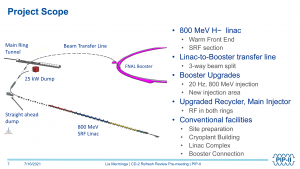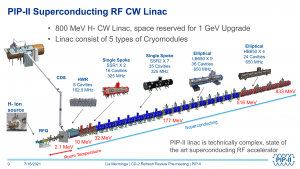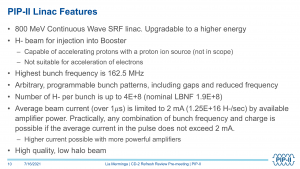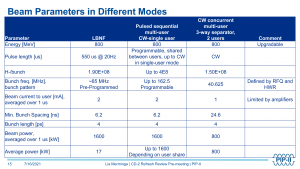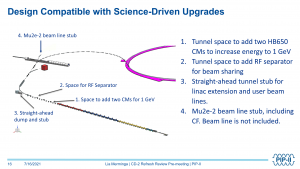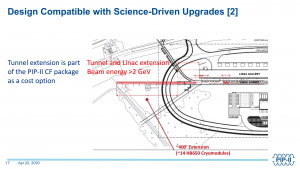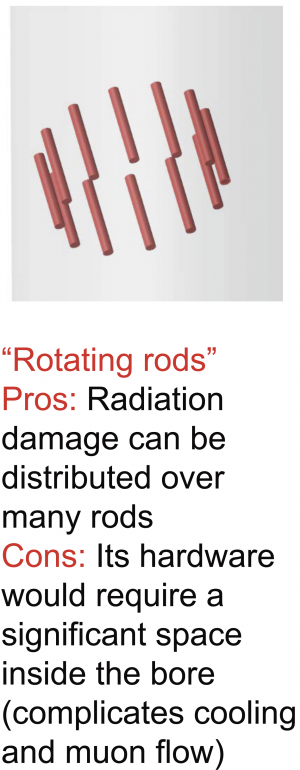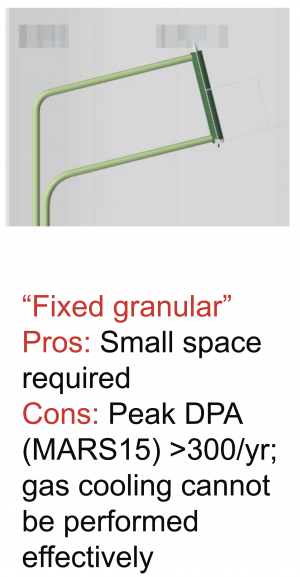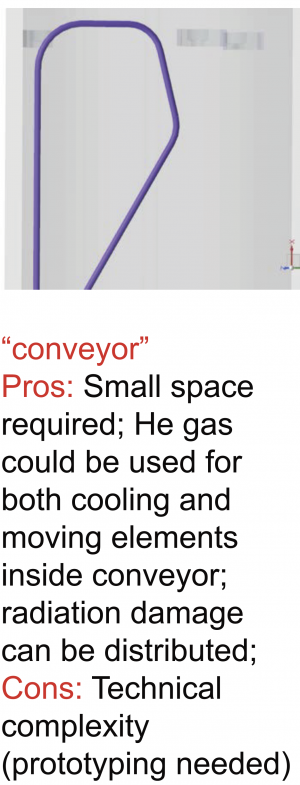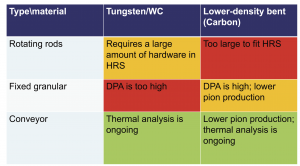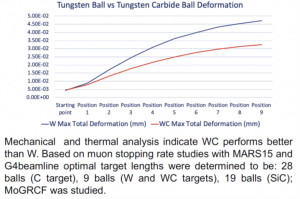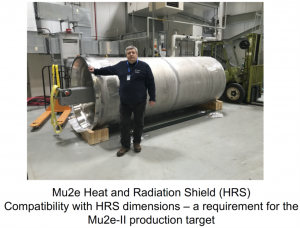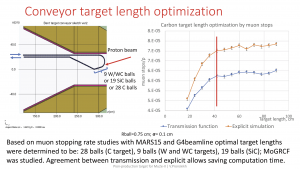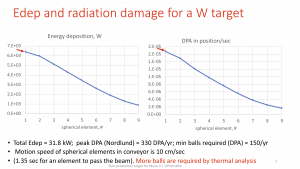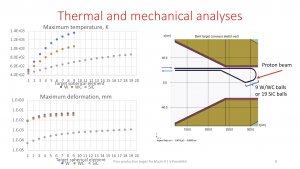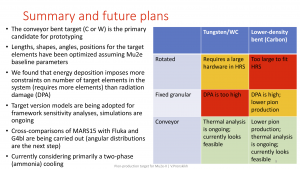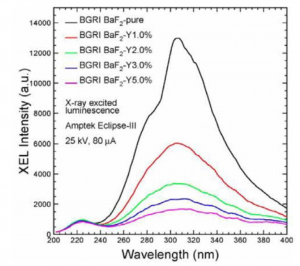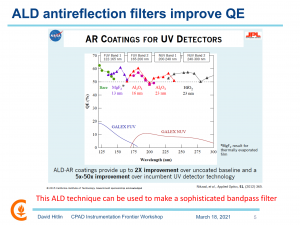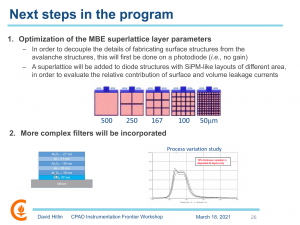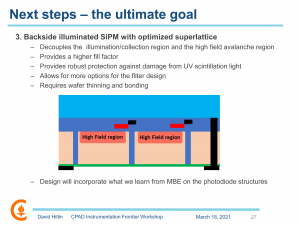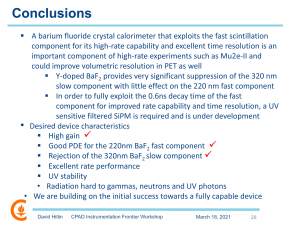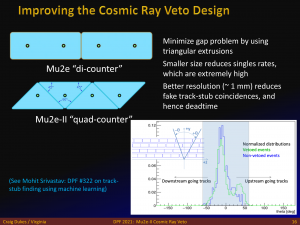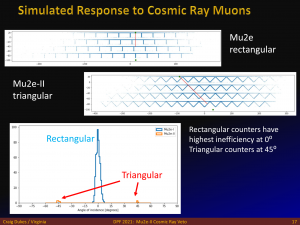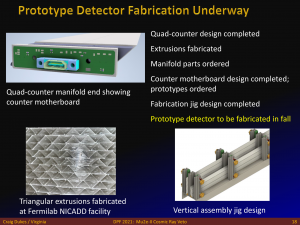Material for speakers: Difference between revisions
No edit summary |
|||
| (30 intermediate revisions by the same user not shown) | |||
| Line 1: | Line 1: | ||
=Mu2e-II= | |||
Contributed paper for Snowmass22 | |||
<ref name=Byrum2022/>https://arxiv.org/abs/2203.07569 | |||
[https://mu2e-docdb.fnal.gov/cgi-bin/sso/ShowDocument?docid=41871 Sample slides based on the Snowmass contributed paper] | |||
NUFACT2022 paper | |||
<ref name=Neuffer2023/>https://lss.fnal.gov/archive/2022/conf/fermilab-conf-22-928-ad.pdf | |||
==References== | |||
<references> | |||
<ref name=Byrum2022> Byrum, K. et al., Mu2e-II: Muon to electron conversion with PIP-II, [https://arxiv.org/abs/2203.07569]</ref> | |||
<ref name=Neuffer2023> Neuffer, D. et ai., A Pion-Production Target for Mu2e-II: Design and Prototype, Phys. Sci. Forum 2023 (NUFACT 2022 paper) [https://lss.fnal.gov/archive/2022/conf/fermilab-conf-22-928-ad.pdf]</ref> | |||
</references> | |||
=Mu2e= | =Mu2e= | ||
[https://mu2e.fnal.gov/public/hep/results/index.shtml Mu2e public results and material for speakers] | [https://mu2e.fnal.gov/public/hep/results/index.shtml Mu2e public results and material for speakers] | ||
=Theory= | =Theory= | ||
We measure | |||
<math> | |||
\begin{equation} | |||
R_{\mu e} \equiv \frac{\Gamma(\mu^-N(A,Z)\to e^-N(A,Z)}{\Gamma(\mu^-N(A,Z)\to \nu_\mu N(A,Z-1)^*)}. | |||
\end{equation} | |||
</math> | |||
In the standard model, this is very small. On aluminum it is estimated to be | |||
<math> | |||
\begin{equation} | |||
R(\mu^-\hbox{Al}\to e^- \hbox{Al}) \sim 2\times10^{-52}\frac{\sin^2\theta_{13}}{0.15}. | |||
\end{equation} | |||
</math> | |||
<ref name=Marciano2008/> | |||
<div><ul> | <div><ul> | ||
| Line 11: | Line 46: | ||
</ul> | </ul> | ||
=References= | ==References== | ||
[Following references not cited above: <ref name=Cirigliano2009/> | |||
<ref name=Marciano1977/>] | |||
<references> | |||
<ref name=Marciano2008> Marciano, William J. and Mori, Toshinori and Roney, J. Michael, Charged Lepton Flavor Violation Experiments, Annual Review of Nuclear and Particle Science, 58 (2008) 315-341.</ref> | |||
<ref name=Cirigliano2009>[https://journals.aps.org/prd/abstract/10.1103/PhysRevD.80.013002 Vincenzo Cirigliano, Ryuichiro Kitano, Yasuhiro Okada, and Paula Tuzon, Phys. Rev. D 80, 013002 (2009)]</ref> | |||
<ref name=Marciano1977> Marciano, William J. and Sanda, A. I., Reaction <math>\mu^-+\hbox{Nucleus}\rightarrow e^-+\hbox{Nucleus}</math> in Gauge Theories, Phys. Rev. Lett. 38 (1977) 1512-1515.</ref> | |||
< | </references> | ||
=PIP-II accelerator= | =PIP-II accelerator= | ||
| Line 58: | Line 102: | ||
<div><ul> | <div><ul> | ||
<li style="display: inline-block; vertical-align: top;"> [[File:TrackerResolutionRequirement.png|thumb|top|Slide illustrating the requirement on track resolution for Mu2e-II compared with Mu2e. | <li style="display: inline-block; vertical-align: top;"> [[File:TrackerResolutionRequirement.png|thumb|800px|top|Slide illustrating the requirement on track resolution for Mu2e-II compared with Mu2e. | ||
Note that the resolution has contributions from several sources. The blue dashed curve on each plot indicates the | Note that the resolution has contributions from several sources - the tacker itself, absorber material, and target material. The blue dashed curve on each plot indicates the | ||
electron spectrum from muon decays in orbit (DIOs). The red curves show the conversion electron spectrum for the | electron spectrum from muon decays in orbit (DIOs). The red curves show the conversion electron spectrum for the | ||
values of <math>R_{\mu e}</math> indicated in the legends.]] </li> | values of <math>R_{\mu e}</math> indicated in the legends. | ||
In more detail: (left) Simulation of the energy distributions of electrons from conversion and the high energy tail of DIO's, for Mu2e. The assumption is <math>6.7\times 10^{17}</math> stopped muons and a conversion electron (CE) rate of <math>10^{-16}</math>. The electron energies are broadened by energy straggling in the stopping target and the Inner Proton Absorber (IPA), and by energy straggling and multiple scattering in the Tracker; | |||
(center) Simulation of the energy distributions of electrons from conversion and the high energy tail of DIO's, for Mu2e-II. The assumption is <math>10^{19}</math> stopped muons and a CE rate of <math>10^{-17}</math>. The energy resolution is assumed to be the same as that expected for Mu2e. There is now a substantial overlap between the DIO background and the CE signal; | |||
(right) Simulation of the energy distributions of electrons from conversion and the high energy tail of DIO's, for Mu2e-II. The assumption is <math>10^{19}</math> stopped muons and a CE rate of <math>10^{-17}</math>. The energy resolution is assumed to be the two times better than Mu2e (a goal of Mu2e-II). | |||
There is now much less overlap between the DIO background and the CE signal, compared to the center plot. | |||
]] </li> | |||
<li style="display: inline-block; vertical-align: top;">[[File:AmbroseCPAD Mu2e Tracker 184MP.jpg|thumb|top]] </li> | <li style="display: inline-block; vertical-align: top;">[[File:AmbroseCPAD Mu2e Tracker 184MP.jpg|thumb|top]] </li> | ||
<li style="display: inline-block; vertical-align: top;"> [[File:AmbroseCPAD Mu2e Tracker 19.png|thumb|top]] </li> | <li style="display: inline-block; vertical-align: top;"> [[File:AmbroseCPAD Mu2e Tracker 19.png|thumb|top]] </li> | ||
| Line 102: | Line 151: | ||
==References== | ==References== | ||
<li> [https://indico.cern.ch/event/1034469/contributions/4431744/] "A Novel Scintillator Detector for the Mu2e-II Experiment and a Muon Tomography Probe of the Interior of the Great Pyramid" </li> | <li> [https://indico.cern.ch/event/1034469/contributions/4431744/] "A Novel Scintillator Detector for the Mu2e-II Experiment and a Muon Tomography Probe of the Interior of the Great Pyramid" </li> | ||
=Trigger and Data Acquisition (TDAQ)= | |||
=Sensitivity= | =Sensitivity= | ||
| Line 108: | Line 160: | ||
=References= | =References= | ||
<li>[https://arxiv.org/pdf/2110.07093.pdf] Muon to positron conversion (2021)</li> | |||
<li>[https://arxiv.org/pdf/2107.02073.pdf] Muon-ion collider for BNL (2021)</li> | <li>[https://arxiv.org/pdf/2107.02073.pdf] Muon-ion collider for BNL (2021)</li> | ||
<li>[https://www.snowmass21.org/docs/files/summaries/RF/SNOWMASS21-RF5_RF0_Frank_Porter-106.pdf] Mu2e-II Snowmass 22 Letter of Interest (2020)</li> | <li>[https://www.snowmass21.org/docs/files/summaries/RF/SNOWMASS21-RF5_RF0_Frank_Porter-106.pdf] Mu2e-II Snowmass 22 Letter of Interest (2020)</li> | ||
| Line 115: | Line 168: | ||
<li>[https://arxiv.org/pdf/1901.06150.pdf] Muon colliders (2019)</li> | <li>[https://arxiv.org/pdf/1901.06150.pdf] Muon colliders (2019)</li> | ||
<li>[https://arxiv.org/ftp/arxiv/papers/1802/1802.02599.pdf] Mu2e-II Expression of Interest (2018) </li> | <li>[https://arxiv.org/ftp/arxiv/papers/1802/1802.02599.pdf] Mu2e-II Expression of Interest (2018) </li> | ||
<li>[https://www.annualreviews.org/doi/10.1146/annurev.nucl.58.110707.171126] Charged Lepton Flavor Violation Experiments (2008)</li> | |||
Latest revision as of 21:12, 26 September 2023
Mu2e-II
Contributed paper for Snowmass22
[1]https://arxiv.org/abs/2203.07569
Sample slides based on the Snowmass contributed paper
NUFACT2022 paper
[2]https://lss.fnal.gov/archive/2022/conf/fermilab-conf-22-928-ad.pdf
References
Mu2e
Mu2e public results and material for speakers
Theory
We measure
[math]\displaystyle{ \begin{equation} R_{\mu e} \equiv \frac{\Gamma(\mu^-N(A,Z)\to e^-N(A,Z)}{\Gamma(\mu^-N(A,Z)\to \nu_\mu N(A,Z-1)^*)}. \end{equation} }[/math] In the standard model, this is very small. On aluminum it is estimated to be [math]\displaystyle{ \begin{equation} R(\mu^-\hbox{Al}\to e^- \hbox{Al}) \sim 2\times10^{-52}\frac{\sin^2\theta_{13}}{0.15}. \end{equation} }[/math] [1]
-
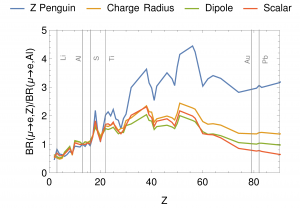 Z dependence of µ → e conversion rates for some sample scenarios [3].
Z dependence of µ → e conversion rates for some sample scenarios [3]. -
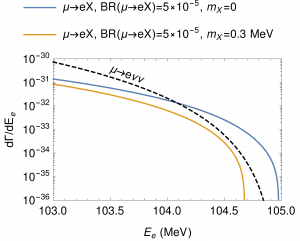 Tail of the electron spectrum for DIOs and for two [math]\displaystyle{ \mu\to eX }[/math] scenarios [4].
Tail of the electron spectrum for DIOs and for two [math]\displaystyle{ \mu\to eX }[/math] scenarios [4].
References
[Following references not cited above: [2] [3]]
- ↑ Marciano, William J. and Mori, Toshinori and Roney, J. Michael, Charged Lepton Flavor Violation Experiments, Annual Review of Nuclear and Particle Science, 58 (2008) 315-341.
- ↑ Vincenzo Cirigliano, Ryuichiro Kitano, Yasuhiro Okada, and Paula Tuzon, Phys. Rev. D 80, 013002 (2009)
- ↑ Marciano, William J. and Sanda, A. I., Reaction [math]\displaystyle{ \mu^-+\hbox{Nucleus}\rightarrow e^-+\hbox{Nucleus} }[/math] in Gauge Theories, Phys. Rev. Lett. 38 (1977) 1512-1515.
PIP-II accelerator
References
Beamline
Production target
Production solenoid
Tracking
-
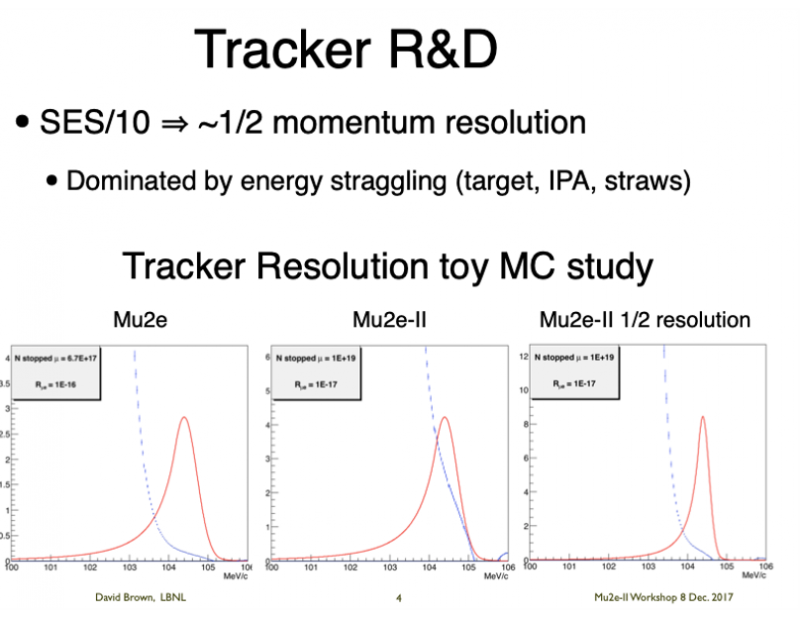 Slide illustrating the requirement on track resolution for Mu2e-II compared with Mu2e. Note that the resolution has contributions from several sources - the tacker itself, absorber material, and target material. The blue dashed curve on each plot indicates the electron spectrum from muon decays in orbit (DIOs). The red curves show the conversion electron spectrum for the values of [math]\displaystyle{ R_{\mu e} }[/math] indicated in the legends. In more detail: (left) Simulation of the energy distributions of electrons from conversion and the high energy tail of DIO's, for Mu2e. The assumption is [math]\displaystyle{ 6.7\times 10^{17} }[/math] stopped muons and a conversion electron (CE) rate of [math]\displaystyle{ 10^{-16} }[/math]. The electron energies are broadened by energy straggling in the stopping target and the Inner Proton Absorber (IPA), and by energy straggling and multiple scattering in the Tracker; (center) Simulation of the energy distributions of electrons from conversion and the high energy tail of DIO's, for Mu2e-II. The assumption is [math]\displaystyle{ 10^{19} }[/math] stopped muons and a CE rate of [math]\displaystyle{ 10^{-17} }[/math]. The energy resolution is assumed to be the same as that expected for Mu2e. There is now a substantial overlap between the DIO background and the CE signal; (right) Simulation of the energy distributions of electrons from conversion and the high energy tail of DIO's, for Mu2e-II. The assumption is [math]\displaystyle{ 10^{19} }[/math] stopped muons and a CE rate of [math]\displaystyle{ 10^{-17} }[/math]. The energy resolution is assumed to be the two times better than Mu2e (a goal of Mu2e-II). There is now much less overlap between the DIO background and the CE signal, compared to the center plot.
Slide illustrating the requirement on track resolution for Mu2e-II compared with Mu2e. Note that the resolution has contributions from several sources - the tacker itself, absorber material, and target material. The blue dashed curve on each plot indicates the electron spectrum from muon decays in orbit (DIOs). The red curves show the conversion electron spectrum for the values of [math]\displaystyle{ R_{\mu e} }[/math] indicated in the legends. In more detail: (left) Simulation of the energy distributions of electrons from conversion and the high energy tail of DIO's, for Mu2e. The assumption is [math]\displaystyle{ 6.7\times 10^{17} }[/math] stopped muons and a conversion electron (CE) rate of [math]\displaystyle{ 10^{-16} }[/math]. The electron energies are broadened by energy straggling in the stopping target and the Inner Proton Absorber (IPA), and by energy straggling and multiple scattering in the Tracker; (center) Simulation of the energy distributions of electrons from conversion and the high energy tail of DIO's, for Mu2e-II. The assumption is [math]\displaystyle{ 10^{19} }[/math] stopped muons and a CE rate of [math]\displaystyle{ 10^{-17} }[/math]. The energy resolution is assumed to be the same as that expected for Mu2e. There is now a substantial overlap between the DIO background and the CE signal; (right) Simulation of the energy distributions of electrons from conversion and the high energy tail of DIO's, for Mu2e-II. The assumption is [math]\displaystyle{ 10^{19} }[/math] stopped muons and a CE rate of [math]\displaystyle{ 10^{-17} }[/math]. The energy resolution is assumed to be the two times better than Mu2e (a goal of Mu2e-II). There is now much less overlap between the DIO background and the CE signal, compared to the center plot.
References
Calorimeter
Cosmic Ray Veto
The Mu2e-II Cosmic Ray Veto will need to cope with roughly a factor 3 higher instantaneous rates from accelerator compared with Mu2e as well as a factor of three higher live time (i.e., cosmic rays), because of the higher duty factor for Mu2e-II compared with Mu2e.
